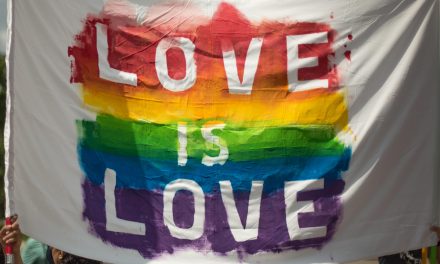(Photo Credits: Andrey_Popov from Shutterstock)
Nearly a decade after the Supreme Court’s landmark decision in Obergefell v. Hodges legalized same-sex marriage nationwide, the ruling is once again in the spotlight. Recently, the Supreme Court was formally asked to overturn Obergefell, reigniting debates over marriage equality in the United States and raising alarm within the LGBTQ+ community.
The appeal comes from Kim Davis, the former Kentucky clerk who made headlines in 2015 for refusing to issue marriage licenses to same-sex couples on religious grounds. Her legal team is now arguing that the Obergefell decision violated her First Amendment rights, framing the case as a clash between religious liberty and LGBTQ+ equality. Moreover, while legal experts say it is unlikely that the Court will use this case as a vehicle to directly dismantle marriage equality, the fact that such a challenge has reached the nation’s highest court has stirred deep anxiety among advocates.
In addition, Davis—who became a controversial figure during the heated national debate over marriage equality—has her own legal battles to contend with. She spent six days in jail in 2015 after defying a court order to issue marriage licenses to same-sex couples. Now, she is appealing a jury’s decision that ordered her to pay $100,000 in emotional damages, along with more than $260,000 in attorneys’ fees. The outcome of this appeal will not only affect Davis personally but could also shape the broader narrative of religious freedom arguments in the context of LGBTQ+ rights.
This renewed focus on Obergefell is happening in a political climate already charged with anxiety. Ever since the Supreme Court overturned Roe v. Wade in 2022, many LGBTQ+ Americans have wondered if marriage equality could one day face the same fate. While some legal scholars argue that Obergefell is safe, recent Supreme Court decisions and rising anti-LGBTQ+ sentiment in certain circles have made the possibility feel more tangible than before. For context, read here and here.
In recent weeks, LGBTQ+ communities online have been buzzing with these very fears. A gay man on Reddit sparked a heartfelt discussion when he posted, “Is anyone else stressed about Obergefell being overturned? I am! I’m posting this video because it brought me some degree of peace of mind.” His words struck a chord, prompting hundreds of replies from men sharing their own hopes, anxieties, and perspectives on the future of marriage equality.
Some took comfort in existing protections. One man reminded others, “Thankfully Biden and the Dems protected same sex marriage with legislation.” He was referring to the Respect for Marriage Act, signed into law by President Joe Biden in 2022, which requires states to recognize same-sex marriages performed elsewhere. While not a flawless safeguard, it reassures many that their unions won’t simply vanish overnight.
Others, however, were less reassured. “I am, because if something like Roe v Wade could get overturned against overwhelming popular support—any of our civil liberties are at risk,” wrote one gay man, who went on to call for bold political countermeasures. His plea was passionate: expand the Supreme Court, fight gerrymandering, and codify civil liberties into law. His rallying cry—“fight crazy with crazy”—reflected a deep sense of urgency.
Not everyone was as alarmed. Another commenter noted, “From what I’ve read recently that is unlikely to be the case that will do it.” He pointed out that the current lawsuits, including Davis’s, are built on shaky legal arguments. For example, government employees cannot claim First Amendment protection to refuse their official duties, which makes her case less threatening in practice.
Yet some expressed broader concerns. One gay man admitted, “I’m more scared about the decrease of support of LGBT rights in the last 5 years especially in the gen Z.” Others echoed that cultural shifts, not just court rulings, may pose the longer-term risk to LGBTQ+ equality.
There were also glimmers of hope. A few commenters pointed out that contract law and the deep integration of marriage into the economy would make unraveling same-sex unions legally and financially chaotic. “Contract law gives me some hope,” one man wrote, highlighting how businesses, insurers, and banks are unlikely to accept such disruption easily.
Some adopted a more stoic approach. “I think it’s a possibility, but I’ve learned not to stress about things out of my control,” said one guy. But others pushed back hard against that mindset, warning that complacency is dangerous. One reply declared, “We are where we are because people are afraid to stand up against this administration and this court. America needs to wake the fuck up and fight back before it’s too late. Newsom has the energy we all need right now.”
Finally, a few men reminded others that before marriage equality, LGBTQ+ couples found other ways to protect themselves—through contracts, wills, and powers of attorney. While no substitute for full equality, these legal tools offered some protection and could again if necessary. Still, for many, the idea of going back to patchwork solutions feels like an unacceptable step backwards.
So, where does this leave us? While the likelihood of Obergefell being overturned remains slim, the conversation highlights very real anxieties about the direction of the Court, the durability of LGBTQ+ rights, and the shifting tides of public opinion. For many, marriage equality represents not just legal recognition, but dignity, safety, and belonging—things that should never feel at risk.
Having said all that, we’d like to hear from you, Adam4Adam blog readers. Are you stressed about Obergefell being overturned? Do you feel reassured by current protections, or do you believe more political action is needed? Share your thoughts and stories with us in the comments section down below. And if there’s a particular topic you’d like us to cover, feel free to email us at [email protected] or [email protected]—we’d love to hear from you.










It has already been stated within the Public Domain that the lawsuit by Kim Davis is not going to cause The Supreme Court to overturn the right for Gays to Marry. This is rather disingenuous and capricious.